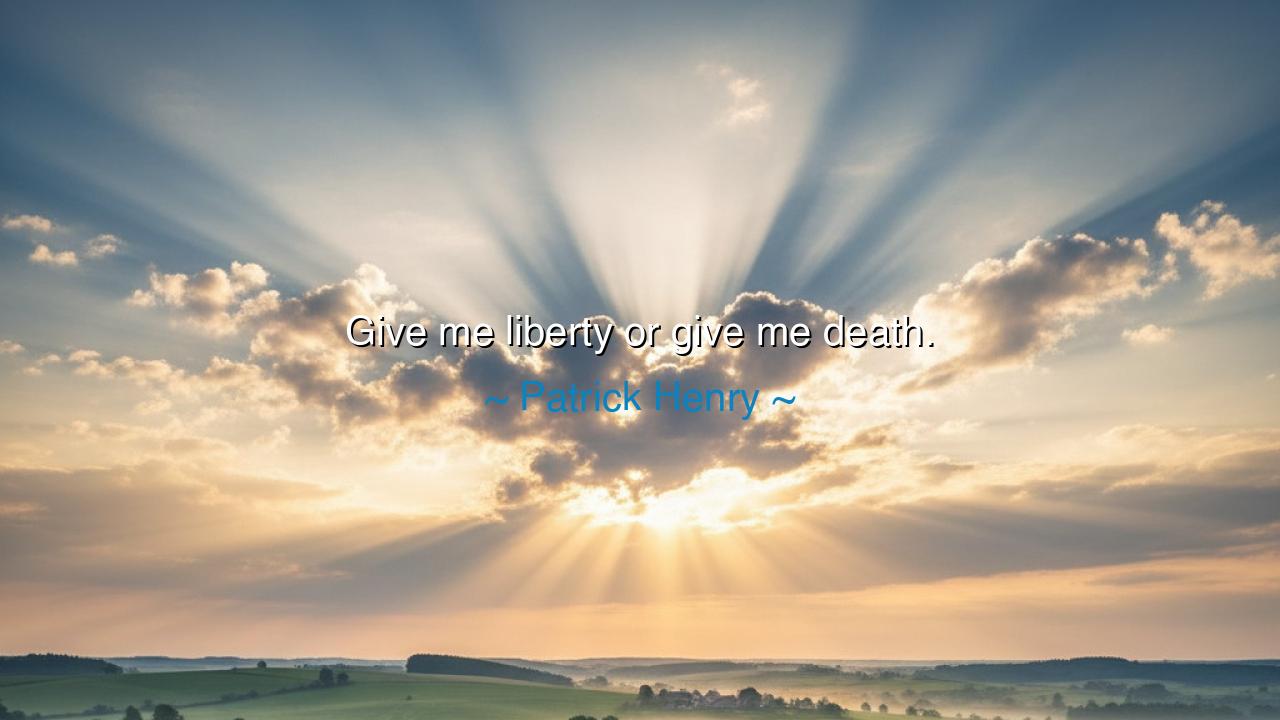
Give me liberty or give me death.






The words of Patrick Henry, “Give me liberty or give me death,” ring like thunder through the corridors of history — fierce, defiant, immortal. They were not uttered in peace or comfort, but in the trembling dawn of revolution, when the chains of empire still bound the American colonies. In March of 1775, in the old St. John’s Church of Richmond, Virginia, Henry rose before his fellow delegates and spoke with a fire that pierced through fear itself. The air was thick with hesitation — many still hoped for peace with Britain. Yet Henry’s voice, filled with conviction, shattered complacency. “Give me liberty or give me death,” he cried, and with those words, he summoned a people from submission to destiny.
To understand the power of this cry, one must see that it was not merely a call to arms — it was a sacred declaration of the human spirit. Liberty, for Henry, was not a political luxury; it was the very breath of the soul. To live without freedom was to live in spiritual death. Thus, he placed liberty and life upon the scales and found that freedom outweighed existence itself. His words are the echo of an ancient truth, one known to all who have fought oppression — that true life begins only where freedom dwells.
To the ancients, such words would have carried the scent of heroism. They would have remembered Leonidas at Thermopylae, who stood with his three hundred warriors and declared that it was better to die free than to live enslaved. They would have recalled Spartacus, who rose against the might of Rome not for conquest but for liberty. Patrick Henry spoke in their tradition — the tradition of those who know that the body’s survival is nothing without the soul’s dignity. His cry was not born from hatred, but from love — love of home, of justice, of the sacred right to self-determination.
The force of Henry’s declaration was also prophetic. In his time, the colonies were weak, divided, and unarmed compared to the empire they defied. Yet he understood that freedom begins in the heart before it exists in the world. His speech transformed despair into resolve, hesitation into unity. It stirred the spirit of a nation yet unborn. Those who heard him described the moment as electric — as though every word was forged in flame. Soon after, the American Revolution became not merely a struggle for land, but a holy war for liberty, waged in the name of every human being’s right to stand upright before God and man.
But beyond its historical setting, Henry’s quote speaks to every generation. Each age faces its own form of tyranny — not always from kings, but from fear, ignorance, or indifference. Many today live chained by invisible masters: conformity, greed, despair. To them, the spirit of Patrick Henry still calls: Choose liberty — the liberty of thought, of conscience, of courage — or perish slowly in the prison of complacency. His words remind us that liberty is not given; it must be claimed, defended, and lived daily, even at cost.
The story of Nelson Mandela in modern times mirrors Henry’s spirit. Imprisoned for twenty-seven years, Mandela could have chosen the safety of submission. But he understood that liberty — both for himself and his people — was worth every sacrifice. When offered conditional release, he refused, declaring, “Only free men can negotiate. Prisoners cannot enter into contracts.” He, too, would have said with Henry, “Give me liberty or give me death,” for to accept bondage was to lose the essence of life itself. And when freedom finally came, it was not vengeance that triumphed, but the human spirit’s capacity to rise above chains.
So, my listener, let this teaching sink deep into your heart: liberty is the soul’s birthright. Guard it fiercely — in your speech, in your conscience, in your choices. Do not trade it for comfort, nor surrender it to fear. Whether the chains are made of iron or of silence, remember that every act of courage, every word of truth, every refusal to bow before injustice is an act of liberation.
For as Patrick Henry knew, to live without liberty is to die while still breathing — but to stand for freedom, even unto death, is to live forever in the hearts of those who follow. Therefore, let every age remember his cry not as the echo of the past, but as a living flame for all who dare to be free: “Give me liberty, or give me death.”






AAdministratorAdministrator
Welcome, honored guests. Please leave a comment, we will respond soon